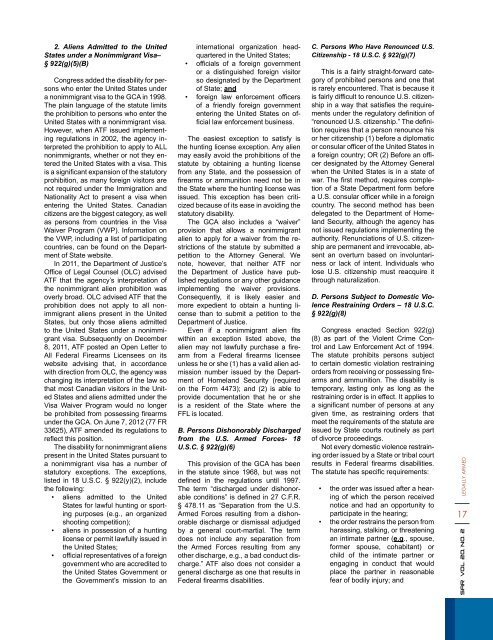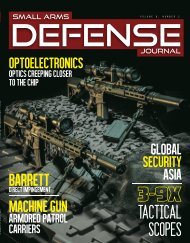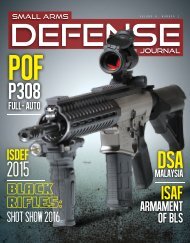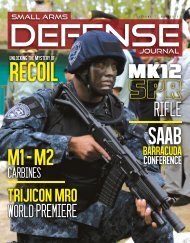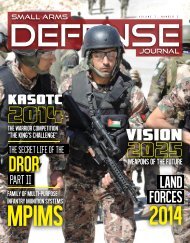SAR 20#2
Create successful ePaper yourself
Turn your PDF publications into a flip-book with our unique Google optimized e-Paper software.
2. Aliens Admitted to the United<br />
States under a Nonimmigrant Visa–<br />
§ 922(g)(5)(B)<br />
Congress added the disability for persons<br />
who enter the United States under<br />
a nonimmigrant visa to the GCA in 1998.<br />
The plain language of the statute limits<br />
the prohibition to persons who enter the<br />
United States with a nonimmigrant visa.<br />
However, when ATF issued implementing<br />
regulations in 2002, the agency interpreted<br />
the prohibition to apply to ALL<br />
nonimmigrants, whether or not they entered<br />
the United States with a visa. This<br />
is a significant expansion of the statutory<br />
prohibition, as many foreign visitors are<br />
not required under the Immigration and<br />
Nationality Act to present a visa when<br />
entering the United States. Canadian<br />
citizens are the biggest category, as well<br />
as persons from countries in the Visa<br />
Waiver Program (VWP). Information on<br />
the VWP, including a list of participating<br />
countries, can be found on the Department<br />
of State website.<br />
In 2011, the Department of Justice’s<br />
Office of Legal Counsel (OLC) advised<br />
ATF that the agency’s interpretation of<br />
the nonimmigrant alien prohibition was<br />
overly broad. OLC advised ATF that the<br />
prohibition does not apply to all nonimmigrant<br />
aliens present in the United<br />
States, but only those aliens admitted<br />
to the United States under a nonimmigrant<br />
visa. Subsequently on December<br />
8, 2011, ATF posted an Open Letter to<br />
All Federal Firearms Licensees on its<br />
website advising that, in accordance<br />
with direction from OLC, the agency was<br />
changing its interpretation of the law so<br />
that most Canadian visitors in the United<br />
States and aliens admitted under the<br />
Visa Waiver Program would no longer<br />
be prohibited from possessing firearms<br />
under the GCA. On June 7, 2012 (77 FR<br />
33625), ATF amended its regulations to<br />
reflect this position.<br />
The disability for nonimmigrant aliens<br />
present in the United States pursuant to<br />
a nonimmigrant visa has a number of<br />
statutory exceptions. The exceptions,<br />
listed in 18 U.S.C. § 922(y)(2), include<br />
the following:<br />
• aliens admitted to the United<br />
States for lawful hunting or sporting<br />
purposes (e.g., an organized<br />
shooting competition);<br />
• aliens in possession of a hunting<br />
license or permit lawfully issued in<br />
the United States;<br />
• official representatives of a foreign<br />
government who are accredited to<br />
the United States Government or<br />
the Government’s mission to an<br />
international organization headquartered<br />
in the United States;<br />
• officials of a foreign government<br />
or a distinguished foreign visitor<br />
so designated by the Department<br />
of State; and<br />
• foreign law enforcement officers<br />
of a friendly foreign government<br />
entering the United States on official<br />
law enforcement business.<br />
The easiest exception to satisfy is<br />
the hunting license exception. Any alien<br />
may easily avoid the prohibitions of the<br />
statute by obtaining a hunting license<br />
from any State, and the possession of<br />
firearms or ammunition need not be in<br />
the State where the hunting license was<br />
issued. This exception has been criticized<br />
because of its ease in avoiding the<br />
statutory disability.<br />
The GCA also includes a “waiver”<br />
provision that allows a nonimmigrant<br />
alien to apply for a waiver from the restrictions<br />
of the statute by submitted a<br />
petition to the Attorney General. We<br />
note, however, that neither ATF nor<br />
the Department of Justice have published<br />
regulations or any other guidance<br />
implementing the waiver provisions.<br />
Consequently, it is likely easier and<br />
more expedient to obtain a hunting license<br />
than to submit a petition to the<br />
Department of Justice.<br />
Even if a nonimmigrant alien fits<br />
within an exception listed above, the<br />
alien may not lawfully purchase a firearm<br />
from a Federal firearms licensee<br />
unless he or she (1) has a valid alien admission<br />
number issued by the Department<br />
of Homeland Security (required<br />
on the Form 4473); and (2) is able to<br />
provide documentation that he or she<br />
is a resident of the State where the<br />
FFL is located.<br />
B. Persons Dishonorably Discharged<br />
from the U.S. Armed Forces- 18<br />
U.S.C. § 922(g)(6)<br />
This provision of the GCA has been<br />
in the statute since 1968, but was not<br />
defined in the regulations until 1997.<br />
The term “discharged under dishonorable<br />
conditions” is defined in 27 C.F.R.<br />
§ 478.11 as “Separation from the U.S.<br />
Armed Forces resulting from a dishonorable<br />
discharge or dismissal adjudged<br />
by a general court-martial. The term<br />
does not include any separation from<br />
the Armed Forces resulting from any<br />
other discharge, e.g., a bad conduct discharge.”<br />
ATF also does not consider a<br />
general discharge as one that results in<br />
Federal firearms disabilities.<br />
C. Persons Who Have Renounced U.S.<br />
Citizenship - 18 U.S.C. § 922(g)(7)<br />
This is a fairly straight-forward category<br />
of prohibited persons and one that<br />
is rarely encountered. That is because it<br />
is fairly difficult to renounce U.S. citizenship<br />
in a way that satisfies the requirements<br />
under the regulatory definition of<br />
“renounced U.S. citizenship.” The definition<br />
requires that a person renounce his<br />
or her citizenship (1) before a diplomatic<br />
or consular officer of the United States in<br />
a foreign country; OR (2) Before an officer<br />
designated by the Attorney General<br />
when the United States is in a state of<br />
war. The first method, requires completion<br />
of a State Department form before<br />
a U.S. consular officer while in a foreign<br />
country. The second method has been<br />
delegated to the Department of Homeland<br />
Security, although the agency has<br />
not issued regulations implementing the<br />
authority. Renunciations of U.S. citizenship<br />
are permanent and irrevocable, absent<br />
an overturn based on involuntariness<br />
or lack of intent. Individuals who<br />
lose U.S. citizenship must reacquire it<br />
through naturalization.<br />
D. Persons Subject to Domestic Violence<br />
Restraining Orders – 18 U.S.C.<br />
§ 922(g)(8)<br />
Congress enacted Section 922(g)<br />
(8) as part of the Violent Crime Control<br />
and Law Enforcement Act of 1994.<br />
The statute prohibits persons subject<br />
to certain domestic violation restraining<br />
orders from receiving or possessing firearms<br />
and ammunition. The disability is<br />
temporary, lasting only as long as the<br />
restraining order is in effect. It applies to<br />
a significant number of persons at any<br />
given time, as restraining orders that<br />
meet the requirements of the statute are<br />
issued by State courts routinely as part<br />
of divorce proceedings.<br />
Not every domestic violence restraining<br />
order issued by a State or tribal court<br />
results in Federal firearms disabilities.<br />
The statute has specific requirements:<br />
• the order was issued after a hearing<br />
of which the person received<br />
notice and had an opportunity to<br />
participate in the hearing;<br />
• the order restrains the person from<br />
harassing, stalking, or threatening<br />
an intimate partner (e.g., spouse,<br />
former spouse, cohabitant) or<br />
child of the intimate partner or<br />
engaging in conduct that would<br />
place the partner in reasonable<br />
fear of bodily injury; and<br />
LEGALLY ARMED<br />
17<br />
<strong>SAR</strong> Vol. 20, No. 2


